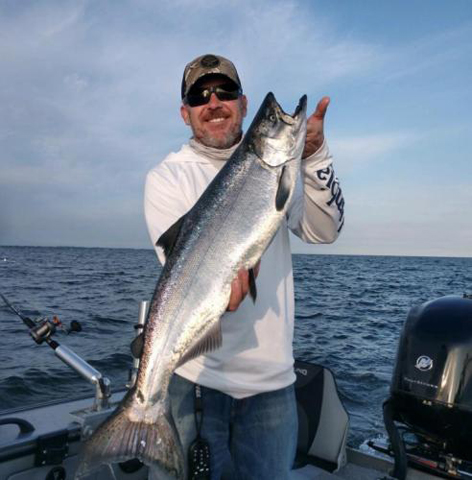Salmon Country

Each fall, anglers from all over the country journey here to the south shores of Lake Ontario to tangle with the king, and I don’t mean that strange-looking burger king. I’m speaking of the king salmon – the hardest fighting fish in freshwater.
I would not be doing my job if I let a September go by without writing about the salmon migration we are lucky enough to experience here in Lake Ontario.
Jeremy Sage of JD Custom Charters was gracious enough to pass on a few tips for anglers on the best techniques to catch these trophy kings this time of year.
Jeremy tells us, “Come the last couple weeks of August, as the nights get cooler, kings will start making their way towards the creeks and rivers that they were originally stocked in. That means the bigger, mature fish are going to be tricky to catch. They stop feeding and merely eat out of aggression.
“The first sign that chinooks are beginning their migration to spawn is the color of their skin; it darkens through to a green olive color and eventually will be a dark brown once they are at the dams or up the rivers.
“Most of the same baits you fish all season will be perfect for targeting spawning kings. I usually run a simpler program the closer and shallower I get to the piers. This means that the deeper the water, the more rods/lures I put in the water to target these fish. At first, light moonshine glow magnum spoons and big glow attractor and fly combos are my go-to. In my lineup at this time of year, I typically run a lot more attractors and flies than spoons. The attractors come in different shapes, which give the fly behind it a different action. Some attractors will make complete 360 circles, and some go side to side while being trolled behind the attractors; you would run something with a hook in it. Most popular are trolling flies – these Mylar/tinsel beauties come in many different colored patterns. I prefer to match the color scheme to your attractor. For example, with a white glow spin doctor with green on it I would try running a green glow fly behind it.
“The distance behind the attractors is also crucial… typically 18 to 24 inches behind your smaller eight-inch attractors. This weekend, I will have two dipsy divers in the water pulling cut bait rigs, three downriggers pulling two spin doctor/e-chip combinations, with one downrigger pulling a magnum spoon. Depending on what depth of water I am working, I will deploy a second set of dipsy divers or run some longer lines far behind or to the sides of my boat.
“Another deadly lure you should have somewhere in your lure spread is a j-plug type bait. These are wobbly baits that usually glow or are chrome in color and have a pretty erratic side-to-side action, which spawning salmon can’t resist.
“Boat speed is very important based on what lures you have in the water. Typically, I keep my lures running at 2.4 to 2.8 mph down speed. That speed is taken off a temperature/speed device that I run off of my downriggers. It is very important to make sure your lures are running at the correct speed where the fish are, versus how fast your boat is moving. Sometimes these two variables differ big time, making this the most important tool I own other than my boat.
“Into September, you can find these salmon right outside the piers and break walls of your nearby tributaries. Some charter captains fish right through to the end of September, targeting these same fish which usually forage the entire lake out to 700 feet of water into 10 to 15 feet.
“Once there is a large congregation of these kings in the shallow water it gets interesting. You can go out there in any kind of boat that is safe for the conditions and catch yourself a 20-pound plus salmon. When I fish in that tight to shore, I run a lot of J-plugs and stick baits. These baits dive only three to five feet, allowing you to run them by themselves or flat lined off the side of your boat. I let 50 to 75 feet of line off and try trolling them off of my downriggers parked one to three feet down in the water.”
Jeremy is a big dog amongst charter captains here in salmon country. He has put in thousands of hours on the water perfecting these salmon techniques, and I thank him for passing them on.
For anglers who don’t have a boat and want to latch on to a fish of a lifetime, contact Jeremy at JD Custom Charters (jdscustomcharters.com), Jeremy Sage’s Facebook page, or call 585-734-8930.
If you are interested in making a lifelong memory while adding a picture to your phone that you can bore people with for years, go catch a king salmon.




